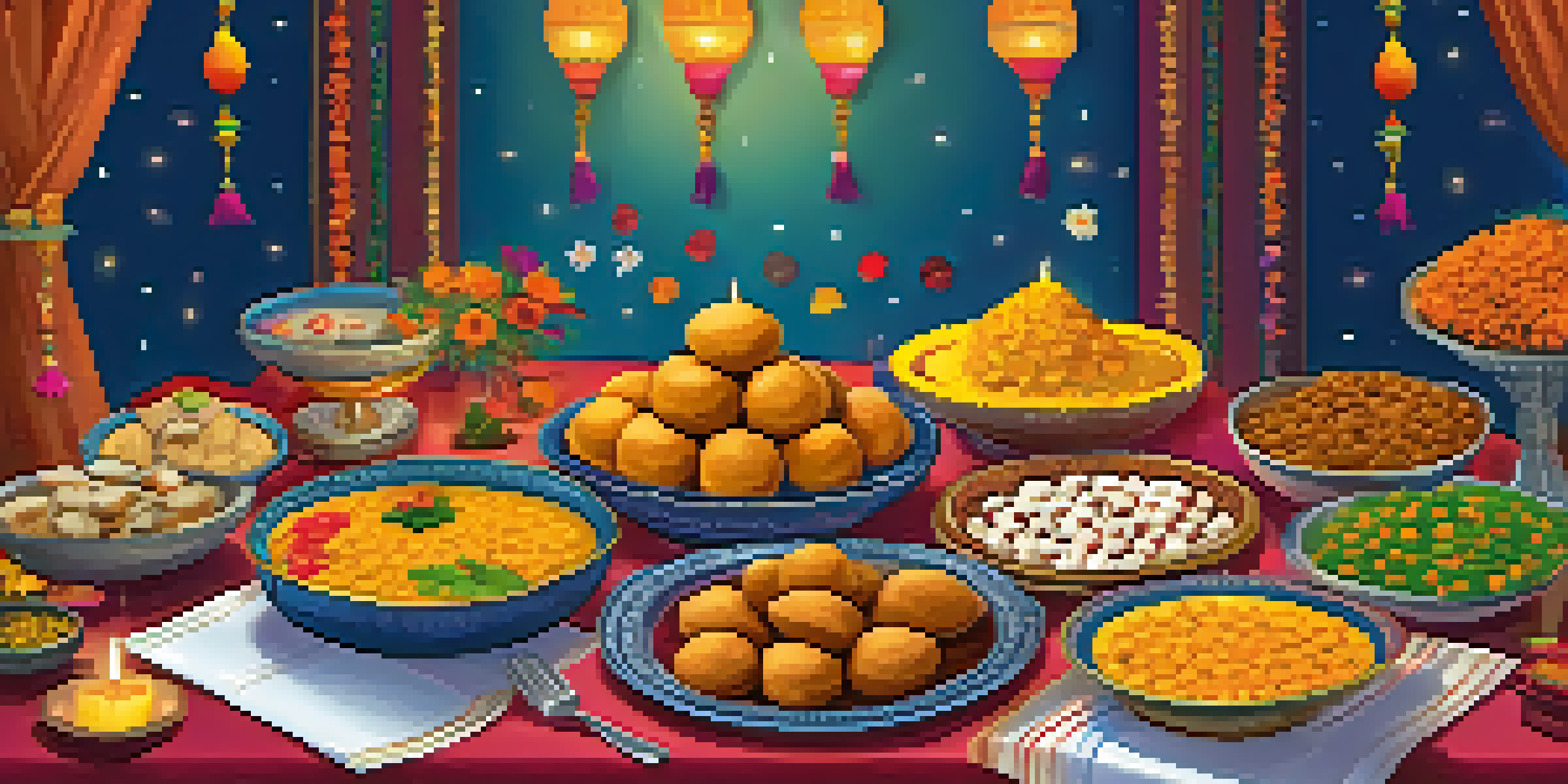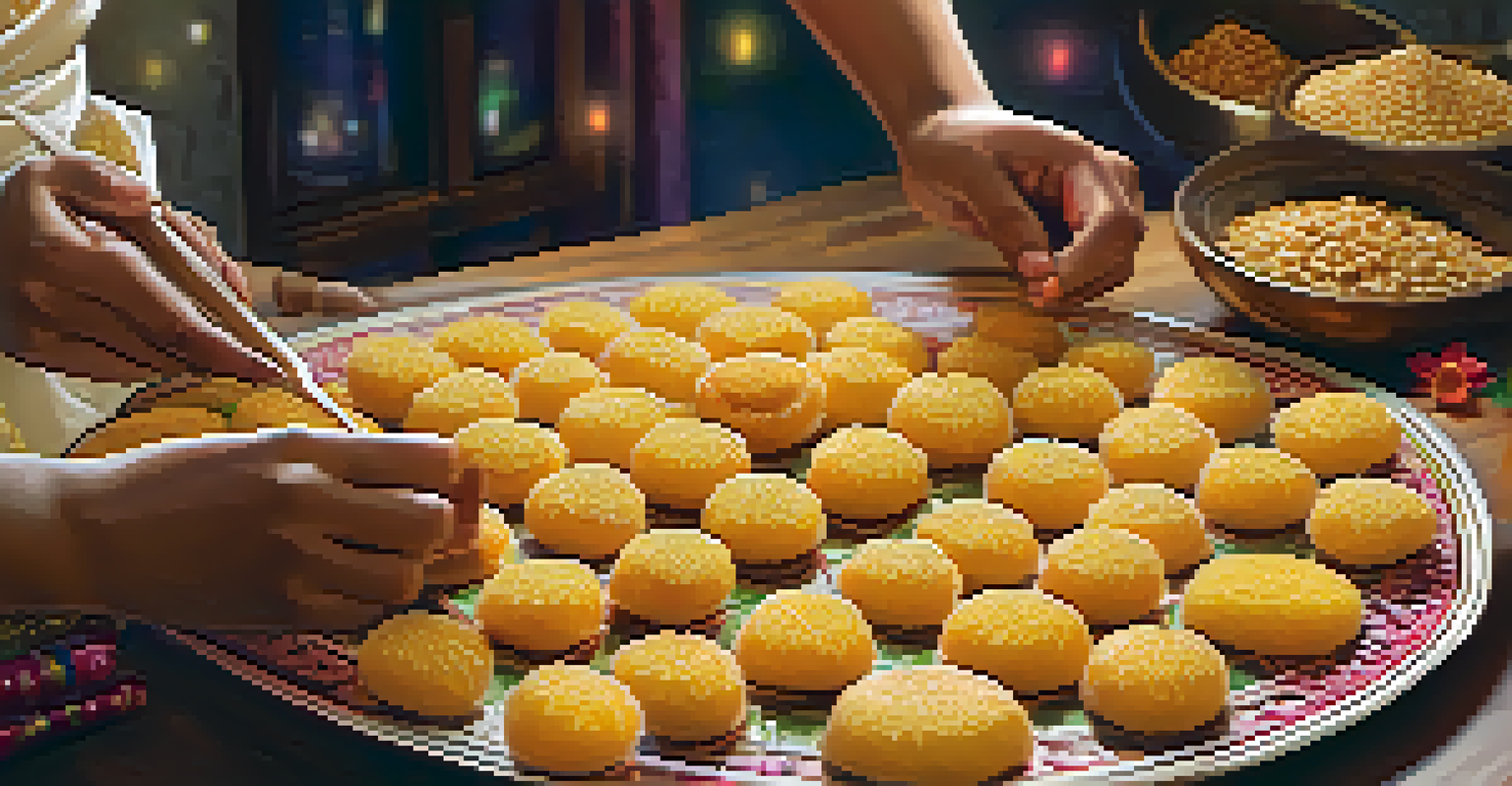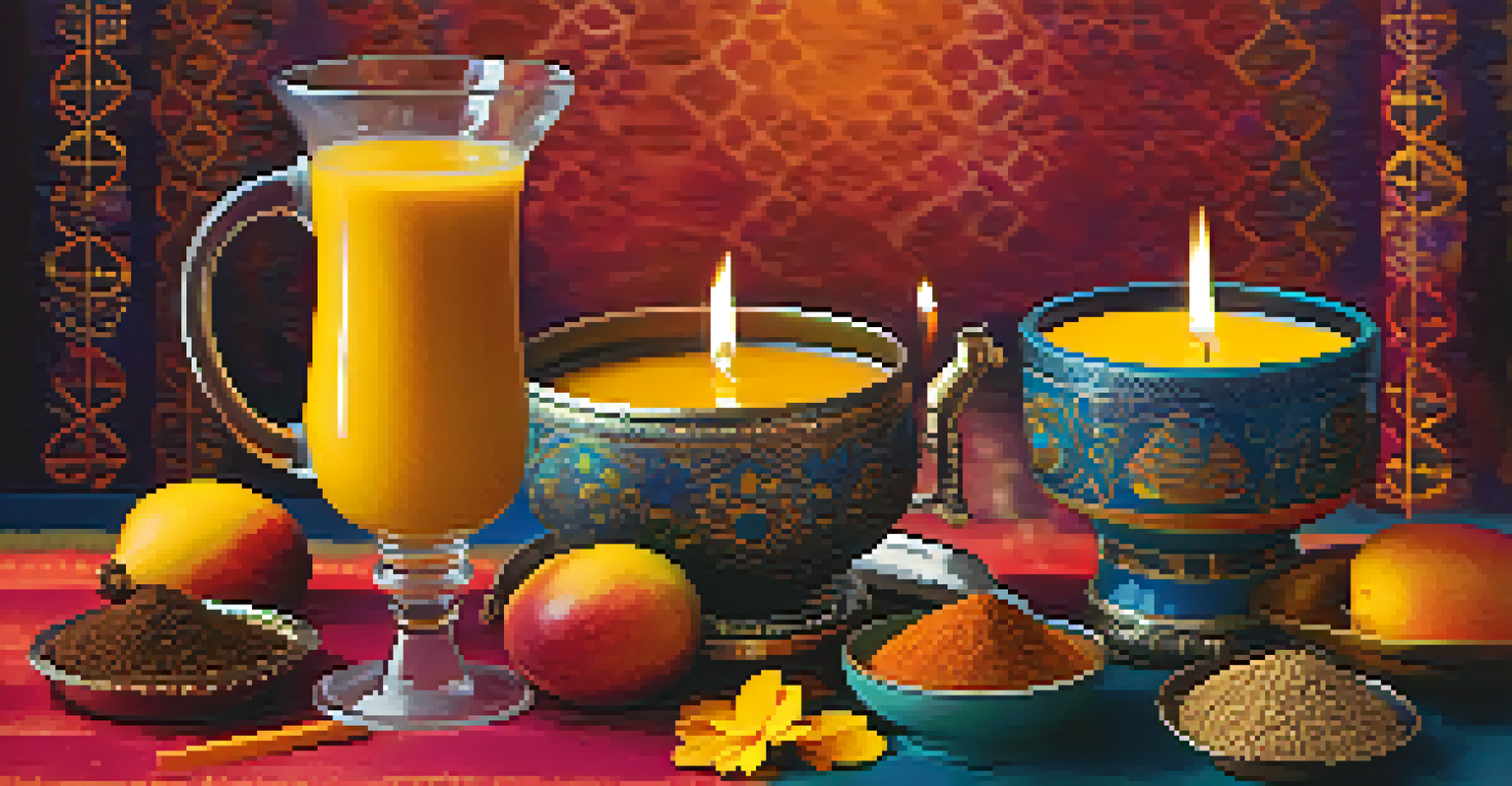Exploring Vegetarian Delights at Diwali Celebrations Worldwide

The Significance of Vegetarianism During Diwali
Diwali, known as the Festival of Lights, is celebrated by millions across the globe. For many, this festival is a time of spiritual reflection, family gatherings, and, most importantly, feasting. Vegetarianism holds a special place in Diwali celebrations, symbolizing purity and a connection to nature. Many devotees choose to abstain from meat as a way to honor the divine and promote harmony during this auspicious occasion.
Eating vegetarian is not just a diet, it's a lifestyle that promotes compassion and harmony with nature.
In India, where the festival originated, a large portion of the population adheres to vegetarian diets. This cultural inclination to vegetarianism is deeply rooted in various religions, such as Hinduism and Jainism, where non-violence is a core principle. As families come together to celebrate, they often prepare elaborate vegetarian dishes that not only cater to dietary preferences but also enhance the festive spirit.
Globally, the vegetarian aspect of Diwali is gaining traction as people embrace plant-based diets for health, environmental, or ethical reasons. This trend has led to a wonderful fusion of traditional recipes and modern culinary innovations, allowing everyone to partake in the joyous celebrations with delicious vegetarian delights.
Traditional Indian Vegetarian Dishes for Diwali
When we think of Diwali, mouthwatering traditional dishes come to mind. Sweets like 'gulab jamun' and 'barfi' are staples in Indian households, often made with ingredients like milk, sugar, and nuts. These desserts are not only delicious but symbolize the sweetness of life and the joy of sharing with loved ones during the festival.

Savory dishes also play a crucial role in Diwali feasts. 'Samosas,' crisp pastry filled with spiced potatoes and peas, are a favorite among many. Alongside, 'chole bhature,' a spicy chickpea curry served with fluffy bread, is a meal that brings families together at the dining table, filling the air with delightful aromas and laughter.
Vegetarianism Symbolizes Purity
During Diwali, vegetarianism represents a connection to nature and spiritual purity, with many people choosing plant-based diets to honor the festival.
In addition to these classic dishes, many families incorporate regional specialties, making their celebrations unique. From South Indian 'idli' and 'sambar' to North Indian 'paneer tikka,' the variety of vegetarian offerings showcases the rich culinary diversity of India, ensuring there’s something for everyone to enjoy.
Global Vegetarian Variations for Diwali
As Diwali spreads beyond India, various cultures have embraced the festival, each adding their own twist to vegetarian cuisine. In countries like Nepal, 'momo,' a type of dumpling filled with vegetables, has become a popular dish during Diwali celebrations. This blend of tradition and local flavors creates an exciting culinary experience for those participating in the festivities.
Food is symbolic of love when words are inadequate.
In the Caribbean, particularly among Indo-Caribbean communities, dishes like 'dhal puri' and 'aloo curry' are often served at Diwali gatherings. These flavorful dishes reflect the fusion of Indian and Caribbean spices, showcasing how cultural influences can create delightful vegetarian options that honor the spirit of the festival.
In Western countries, where plant-based diets are on the rise, many are opting for vegan versions of traditional Indian dishes for their Diwali celebrations. Creative chefs are whipping up dishes like vegan 'butter chicken' made with tofu and coconut cream, allowing everyone to indulge in the festive spirit while adhering to their dietary choices.
The Role of Sweets in Diwali Celebrations
Sweets are a significant aspect of Diwali, symbolizing joy and the sharing of happiness. They are often exchanged between friends and family, representing goodwill and prosperity. Traditional sweets like 'kaju katli,' made from cashew paste and sugar, are not only delicious but also often prepared in elaborate shapes, adding to the festive decor.
For those who prefer healthier options, many families are now experimenting with less sugary alternatives or using natural sweeteners. This shift not only caters to health-conscious individuals but also allows for a wider variety of flavors in traditional recipes. Imagine enjoying a 'besan ladoo' made with jaggery instead of refined sugar – a wholesome twist on a beloved classic!
Diverse Vegetarian Dishes Abound
The celebration features a wide range of traditional and innovative vegetarian dishes, showcasing India's rich culinary diversity and catering to various dietary preferences.
In addition to homemade sweets, the market is flooded with beautifully packaged treats during Diwali. These not only make for attractive gifts but also introduce a range of vegetarian options, from chocolate-covered nuts to exotic Indian sweets, ensuring that there's something for everyone’s palate.
Festive Drinks to Complement Vegetarian Dishes
No celebration is complete without a few festive drinks to accompany the delicious food. During Diwali, traditional beverages such as 'masala chai' or spiced tea are often served, offering warmth and comfort amidst the festivities. The aromatic blend of spices like cardamom and ginger creates a cozy atmosphere that enhances the overall experience.
Another popular drink is 'lassi,' a refreshing yogurt-based beverage that can be sweet or savory. Sweet lassi, often flavored with fruits like mango, provides a delightful contrast to spicy dishes, while savory lassi helps cool down the palate. It’s a perfect example of how drinks can balance and elevate the dining experience during Diwali.
In recent years, many have also turned to innovative non-alcoholic cocktails, using seasonal fruits and spices to create vibrant, festive drinks. These options not only look appealing but also offer a range of flavors that pair beautifully with various vegetarian dishes served during the celebration.
Vegetarian Festivities: Rituals and Traditions
Diwali is rich in rituals, many of which involve vegetarian practices that emphasize purity and devotion. One of the most important rituals is the preparation of a special meal offered to the deities, known as 'prasad.' This meal is entirely vegetarian, often including dishes like 'puri,' 'halwa,' and an array of sweets, creating a vibrant feast for the gods.
Families often come together to cook these dishes, making the process a communal activity that strengthens bonds and creates lasting memories. Each dish holds significance, with particular flavors and ingredients symbolizing different aspects of prosperity and happiness, which are central to the Diwali celebration.
Sweets and Drinks Enhance Festivities
Sweets and festive drinks play a vital role in Diwali, symbolizing joy and community, while also offering healthier alternatives to traditional recipes.
Moreover, many families also participate in charitable acts during this time, preparing vegetarian meals for those in need. This spirit of giving not only spreads joy to others but also reinforces the importance of compassion and community, making Diwali a truly inclusive festival.
Embracing Modern Vegetarian Innovations for Diwali
As culinary trends evolve, so do the ways in which we celebrate festivals like Diwali. Many chefs and home cooks alike are experimenting with plant-based ingredients to create innovative vegetarian dishes that still honor traditional flavors. This creativity is evident in dishes like 'quinoa biryani' or 'lentil burgers,' which bring a modern twist to classic recipes.
Social media has played a significant role in sharing these innovative recipes, inspiring others to try their hand at fusion cooking during Diwali. With countless blogs and videos available, the younger generation is more inclined to explore diverse vegetarian options, blending different cuisines while keeping the essence of the festival intact.

This culinary exploration not only makes Diwali more exciting but also encourages sustainability by utilizing local and seasonal ingredients. As we celebrate the Festival of Lights, embracing these modern innovations allows everyone to enjoy the festivities in their unique way while still paying homage to cultural traditions.